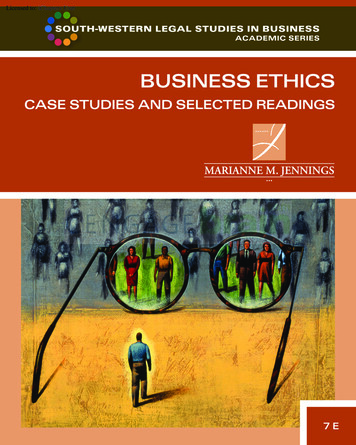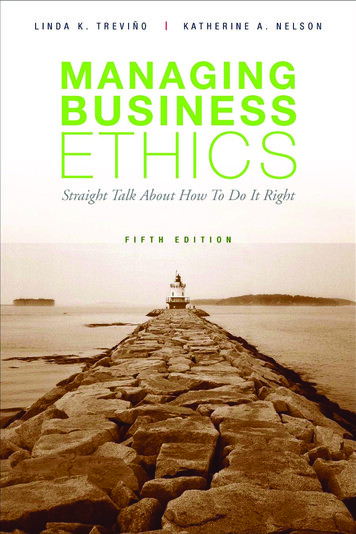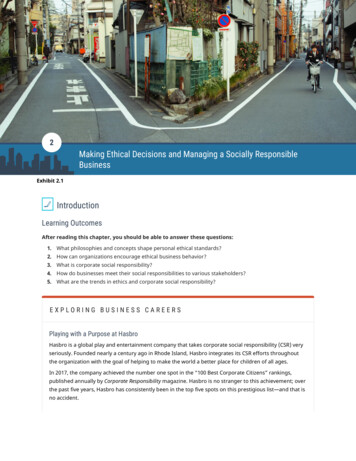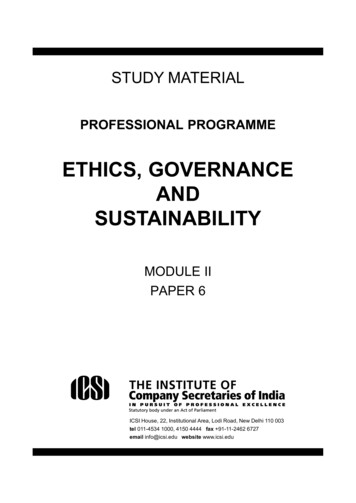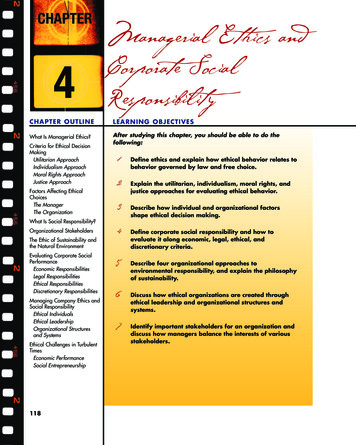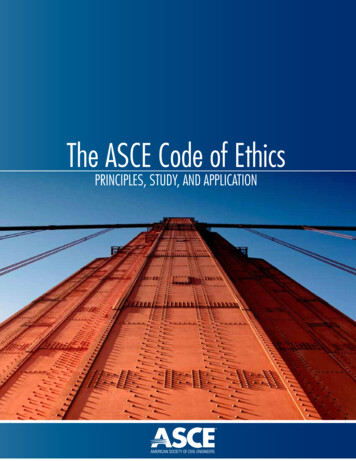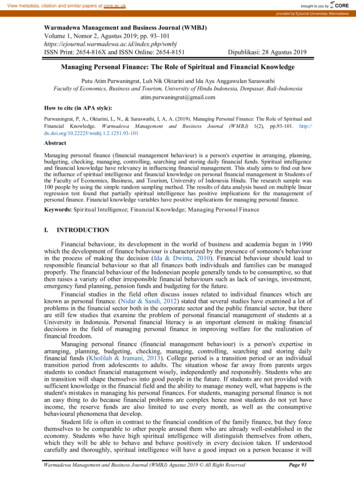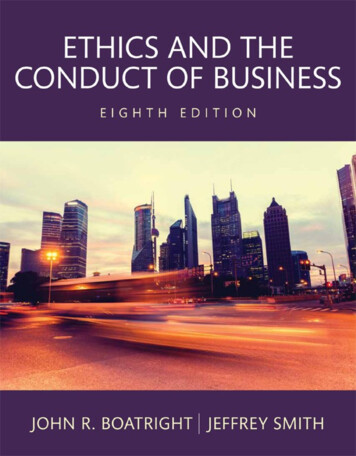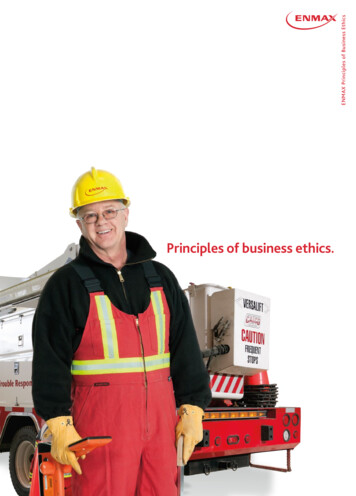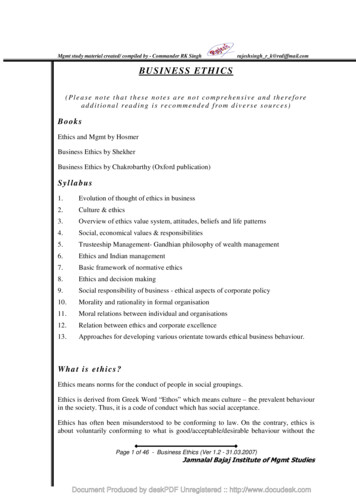
Transcription
International Journal of Multidisciplinary Research and Modern Education (IJMRME)ISSN (Online): 2454 - 6119(www.rdmodernresearch.org) Volume II, Issue I, 2016MANAGING PERSONAL AND PROFESSIONALETHICS: A STEP TOWARDS QUALITY LIFEDr. Ankita R. BrahmbhattCo-Ordinator & Assistant Professor (B.Com. – Self Financed &M.Com), C.P Patel & F.H Shah Commerce College, Anand, GujaratAbstract:The fundamental purpose of this article is to provide an overview of ethics inpersonal and professional endeavor. It has been reviewed that the development ofpersonal and professional ethics has been the contemporary state of practice. Ethics arethe standards of right and wrong that refer to what we should and should not do. Often,our personal feelings differ from those of our employers. The tasks we are asked to do atwork may not be illegal, but they can impose a conflict with what we think is the rightthing to do in our personal life. The majority of professionals solve this by choosing toseparate their professional lives from their personal lives.It is an undertaking not just to ask difficult questions but have the courage to do so.The simple meaning, definitions, key areas including major differences between personaland professional ethics will be addressed. This engagement might include discretionaryeffort to build up strong sense of personal and professional codes and might help inbuilding adaptive and flourishing workplaces within an increasingly and challengingglobal marketplace.Keywords: Ethics, Personal Ethics, Professional Ethics & Codes, etc.“Dear teachers, I am a survivor of a concentration camp. My eyes saw what no manshould witness: Gas chambers built by learned engineers, children poisoned by educatedphysicians, infants killed by trained nurses, women and babies shot and burned by highschool and college graduates. So, I an suspicious of education. My request is, help yourstudents to become human. Your efforts must never produce learned monsters, skilledpsychopaths, educated Eichmanns. Reading, writing, arithmetic are important only if theyserve to make our children more humane.” says ethicist Principal of the American schoolevery year to the school teachers even today.Introduction:Since ages, it has been observed that human beings have been constantly puttingall sorts of efforts to make life better, comfortable and quality based. Looking to all thescientific inventions and advancements, it would be rather unfair if we do not agreewith the fact that life has truly been made better and comfortable. But, the doubt arisesas to whether we can address this as quality and happy life. With the recent challenges,one of the most challenges which have probably put all the organisations in dilemma isto manage both personal and professional ethics and train their manpower accordinglyin order to attain the organisational goals and objectives. It is very difficult task for anyemployers to make their employees understand as to what are their personal ethics andvalues and what are they expected to in terms of professional ethics. It is very obviousthat every individual are born different and hence they carry their own beliefs,thoughts, behavior, codes, etc. No matter how vast the gap is in their beliefs and values,they are to behave and perform their duties as per the coded professional ethics. Thisperhaps turns out into conflicts in organisations. Our rich scriptures give us deepthought and understanding in this regard. It is mentioned in almost every Hinduscriptures that both Para and Apara Vidya actually balances our life. Somehow, with ourmore inclination towards science and technology individuals are much more towardsmaterialistic and worldly affairs. With these, the more focus and probably the only focus140
International Journal of Multidisciplinary Research and Modern Education (IJMRME)ISSN (Online): 2454 - 6119(www.rdmodernresearch.org) Volume II, Issue I, 2016is left towards Apara Vidya, that is for materialistic luxuries and pleasure. Hence, the bigissue has been rooted in context of ethics. In Ashram age , the students were taught boththese Vidya, in which Para Vidya mainly focused on spiritualism, philosophy, ethics,practical lessons of life and so on.What is Ethics?The term comes from the Greek word ethikos from ethos, which means "custom,habit". The term ‘Ethics’ often is understood as the sense of what is right and wrong.Ethics, sometimes known as moral philosophy, is a branch of philosophy that involvessystematizing, defending and recommending concepts of right and wrong conduct, oftenaddressing disputes of moral diversity.[1]. Philosophical ethics investigates what is thebest way for humans to live, and what kinds of actions are right or wrong in particularcircumstances.Ethics Defined:The Cambridge Dictionary of Philosophy states that the word ethics is"commonly used interchangeably with 'morality' . and sometimes it is used morenarrowly to mean the moral principles of a particular tradition, group or individual."[2]Dino Lobaton states that "standard definitions of ethics have typically included suchphrases as 'the science of the ideal human character' or 'the science of moral duty' ".[3]Richard William Paul and Linda Elder define ethics as "a set of concepts and principlesthat guide us in determining what behavior helps or harms sentient creatures".[4]1What is Personal Ethics & is it really Personal?Personal Ethics is generally considered as the basic principles and values thatgovern interactions among individuals. It can also be used to describe a particularperson's own, idiosyncratic principles or habits Sound personal ethics are typicallythose that positively impact the experience of others when used to govern anindividual's social or business related behavior, and at the very least, such ethics shouldnot have a negative impact on others. It may also be used to characterize the questionsof right-conduct in some specific sphere, even when such right-conduct is not examinedphilosophically. Personal ethics refers to the ethics that a person identifies with inrespect to people and situations that they deal with in everyday life.Personal ethics is a category of philosophy that determines what an individualbelieves about morality and right and wrong. This is usually distinguished frombusiness ethics or legal ethics. These branches of ethics come from outsideorganizations or governments, not the individual's conscience. Personal ethics can affectall areas of life, including family, finances and relationships.Personal Ethics: Where has it Come from?There is some disagreement on where ethics originate from. Some philosophersuse man's sense of morality to support the existence of God. These philosopherstypically agree that a divine power instilled personal morality in humankind, creating abasic universal system of right and wrong.Other philosophers argue that ethics are not inherent at all and that childrenlearn right and wrong solely from social conditioning. This could be the cause of thediffering personal ethics found throughout the world. These philosophers typicallysuggest that a person's ethics are learned from families, friends and teachers. Someethics might also be adapted from individual experiences. The purpose of personalethics is often debated. Religion inspires a large portion of ethics. Many devotedfollowers are willing to adhere to a specific morality system on faith alone.141
International Journal of Multidisciplinary Research and Modern Education (IJMRME)ISSN (Online): 2454 - 6119(www.rdmodernresearch.org) Volume II, Issue I, 2016Others are motivated by humanitarian interests. These personal ethics can breed loftygoals. Some people shape their actions and priorities around ending world hunger,slowing global warming or encouraging world peace. Humanitarian efforts can also bemore subtle, such as random acts of kindness for a neighbor or volunteering as a tutor.Sometimes different motivations can blend together. A religious person might makepersonal ethical choices that simultaneously please her god while also helping hercommunity.Another possible motivation for personal ethics is to serve the individual.Philosophers might argue that a child will learn to share, tell the truth and work hardbecause he sees that these actions benefit him. For example, when a child chooses tobreak the rules of a game, he is creating conflict and building a barrier between himselfand his peers. On the other hand, the child who plays by the rules enjoys friendship andintimacy with his peers, ultimately benefiting himself.Personal Ethics with reference to Shikshapatri:The various verses of the Shikshapatri which is a scripture of moral teachings byBhagwan Swaminarayan lays down the codes of non violence, tolerance, atonement,continence, devotion, philosophy, diet, hygiene, ecology, social and professional ethics,finance, employment and so on .Furthermore, he writes that “Whosoever obeys thisShikshapatri will attain the four purusharthas of dharma,arth,kam and moksha.( Verse206) It is clearly mentioned in Shikshapatri about the practice of Non-violence in whichit depicts that “All scriptures advocate ahimsa (non-violence) as the highest dharma.(Verse 12) With these many moral practices are cited like: Never gamble. (Verse 18) Never steal; not even for religious work. (Verse 17) Never commit a breach of trust.(Verse 37) Never falsely blame anyone, even for personal gain. (Verse 20) Never publicise, anywhere, the secrets of others. (Verse 75) Never praise oneself. ( Verse 37) Never enter or exit stealthily. (Verse 33) Never lodge at a place without the owner’s permission. (Verse 33) Only spend in accordance with one’s income. Spending more than one’s incomewill result in great misery. (Verse 145) Serve your mother, father, guru and ill people for life according to your means.(Verse 139)Professional Ethics: Not Always by Choice:Professional ethics encompass the personal, organizational and corporatestandards of behavior expected of professionals.[1] Professionals, and those working inacknowledged professions, exercise specialist knowledge and skill. How the use of thisknowledge should be governed when providing a service to the public can beconsidered a moral issue and is termed professional ethics.[2] Professionals are capableof making judgments, applying their skills and reaching informed decisions in situationsthat the general public cannot, because they have not received the relevant training. [3]Professional ethics the ethical norms, values, and principles that guide a profession andthe ethics of decisions made within the profession. [4] Professionally accepted standardsof personal and business behavior, values and guiding principles. Codes of professionalethics are often established by professional organizations to help guide members inperforming their job functions according to sound and consistent ethical principles. [5]142
International Journal of Multidisciplinary Research and Modern Education (IJMRME)ISSN (Online): 2454 - 6119(www.rdmodernresearch.org) Volume II, Issue I, 2016 One should always take due care of one’s servants, (employees and labourers),according to one’s means, with regard to their food and clothing. (Verse 67) Labourers should be given wages and grains as agreed upon, but not less. (Verse152) Do not enter into business or social relationships with wicked people. (Verse152) Every person should be addressed with respect to his status and the prevailingcircumstances, and should not be addressed in any other way. (Verse 68) Teach the knowledge one has to others. (Verse 36) Codes of behaviour, social dealings and penance – these three should bepracticed as per one’s place, time, age, wealth, caste and ability. (verse 120)Do Personal Ethics differ from Professional Ethics?Professional ethics and personal ethics have two distinct applications as one isinvolved in one’s own personal life and affects merely their perception. Personal ethicsis probably more general, and is simply “practicing becoming an excellent human being”with respect to people and situations in everyday life (our family, our friends, ourcommunity). Professional ethics is probably more specific, and is “practicing becomingan excellent human being” with respect people and situations in work life (co-workers,customers, suppliers, the company).Professional ethics play a unique role in that a person is held to a certainstandard when in the workplace and must abide by a specific set of ethics that isrequired by all employees of the company.“However, although your personal life is distinctly different from yourprofessional life, I feel that your ethics roll over from one to another and if you havegood ethical values in one area you will have them in the other. There is an exception tothis and that is of the person who has low personal ethical standards, for this person itis less likely that they will have high standards professionally because of their inherentlow personal ethical values. It is important to practice what you preach at work in yourdaily life and live by a set of ethical codes which guide your actions in all aspects of lifeand your personal/professional journey”, says Nick Melillo, Internet Marketing Expert.[1]Personal ethics can influence all different areas of life such as family, finances,religion or relationship. Here the individual has the liberty and the freedom to choosehis/her own set of rules if his conscience conflict with that of the surroundings.Professional ethics defines adherence to rules and regulation. Here the individual isexpected to follow religiously, the code of ethics framed by the organization. [2] It can beheavily influenced by the culture of the organization but it cannot change as frequentlyas the personal ethics. There may be at times where our personal ethics can conflictwith our professional one, for instance, when a Professor enforces Not Clear result to astudent as per law and the student explaining the cause for not being able to write in thetest because of accidental death of father. In such case, even if he is personally againstthis decision, he is abide by the professional ethics to do so. So by setting out expectedbehaviour in the form of professional ethics, professionals try to uphold a goodreputation. On the other hand, professionals are also expected to be honest and respectthe code of ethics by not getting involved in any conflict of interest. A conflict ofsituation may occur if an individual tries to achieve personal goal while at professionwhich ultimately leads to corruption.143
International Journal of Multidisciplinary Research and Modern Education (IJMRME)ISSN (Online): 2454 - 6119(www.rdmodernresearch.org) Volume II, Issue I, 2016The Divine Technology: Managing P & P Ethics and Roadmap to Quality Life:In the famous zoo of Bronks, Newyork, there is a special exit zone for visitorscarrying a huge mirror and the statement is written is written below it as,“ Now you arelooking at one of the most ferocious animals in the world: the only animal that kills itsown kind.” Dr. APJ Abdul Kalam, the former President of India once met His DivineHoliness Pramukh Swami Maharaj who is the fifth successor of Shri BochasanwasiAkshar Purshottam Swaminarayan Santha (popularly known as BAPS) on 30th June2001 and stated “To make India the most developed nation, 500 eminent Engineershave identified five key areas: Education, Health, Agriculture, Information &Communication and Critical Technology.” Listening this, Swamiji spontaneouslyrequested Dr. Kalam to add the fifth key area and that is Faith in God and Spiritualism. Itreveals that with Para Vidya, Apara Vidya is equally essential. Understanding thesignificance of Divine Technology, Warn Brown, the NASA Space Wizard has articulated,“For only with God re-instated in the heart of the world, will he provide us with ethicalguidance through dangers of technological revolutions.” Hence, is said by BenjaminFranklin, “Our humanity is a diseased humanity. It is not knowledge we need, buthumanity is in need of something spiritual.” Similar are the words of Thomas Campis as,“the humble knowledge of thyself is the surer way to God than the deepest researchafter science.”Though differences found both in Professional and Personal Ethics, it is revealedthat the person strong and firm in Personal ethics are more likely to follow ProfessionalEthics, leaving all conflict aside. It is always a topic of debate as to where do one learnPersonal Ethics from? Many scholars have shared their views as to family, neighbours,schools; surroundings, etc are more likely to make the person come across PersonalEthics. But it majorly is concerned about one’s own thinking of behaviour and attitude.Similarly, Professional Ethics too do not match to every Profession. However, much ofPersonal Ethics are useful to identify and strengthen Professional Ethics. From thevarious theories and models of Ethical building and resolving ethical conflict at theworkplace, it can be said that Ethics is something a belief and moral values and cannotbe forcefully implemented. In this context, the Divine Technology stands to be strongerif the person believes that God is the Goal, God is the way and God is the means.Therefore, Abraham Lincoln (1861-1865) wrote a letter to the Principal of the school ofhis son addressing saying, “He will have to learn, I know, that all men are not just, allmen are not true. Teach him that for every enemy, there is a friend. Teach him, if youcan, that a dollar earned is of far more value than five found In school, teach him it isfar more honorable to fail than to cheat Teach him to have faith I his own ideas, even ifeveryone tells him they are wrong Teach him to be gentle with gentle people andtough with the tough This is a big order; but see what you can do ”As said by the philosopher, “An ounce of practice is more than tones of theories.”Ethics, either Personal or Professional is to put into practice. This can only lead us totrue peace and quality life. Or else as American President Lindon Jhonson (1965) says,“The guns, the bombs, the rockets and warships are the symbols of humanity’s failuresto find the way to true peace.”References:1. Azurmendi, J. 1998: "The violence and the search for new values" in EuskalHerria krisian, (Elkar, 1999), pp. 11-116. ISBN 84-8331-572-62. Blackburn, S. (2001). Being good: A short introduction to ethics. Oxford: OxfordUniversity Press.144
International Journal of Multidisciplinary Research and Modern Education (IJMRME)ISSN (Online): 2454 - 6119(www.rdmodernresearch.org) Volume II, Issue I, 20163. Caroline Whitbeck, "Ethics in Engineering Practice and Research" CambridgeUniversity Press, 1998 page 404. De Finance, Joseph, An Ethical Inquiry, Rome, Editrice Pontificia UniversitàGregoriana, 1991.5. De La Torre, Miguel A., "Doing Christian Ethics from the Margins," Orbis Books,2004.6. Derrida, J. 1995, The Gift of Death, translated by David Wills, University ofChicago Press, Chicago.7. D'Urance, Michel, Jalons pour une éthique rebelle, Aléthéia, Paris, 2005.8. Encyclopedia of Ethics. Lawrence C. Becker and Charlotte B. Becker, editors.Second edition in three volumes. New York: Routledge, 2002. A scholarlyencyclopedia with over 500 signed, peer-reviewed articles, mostly on topics andfigures of, or of special interest in, Western philosophy.9. Fagothey, Austin, Right and Reason, Tan Books & Publishers, Rockford, Illinois,2000.10. ‘Gems from Shikshapatri’, originally written by Bhagwan Swaminarayan on 11thFebruary 1826 CE , translated in February 2006), Swaminarayan Aksharpith,Amdavad, page:11-1711. Guy Cools & Pascal Gielen, The Ethics of Art. Valiz: Amsterdam, 2014.12. nal-ethics.html13. ssional-ethics.html14. ethics/.15. tm.16. Internet Encyclopedia of Philosophy: "Ethics"17. John Deigh in Robert Audi (ed), The Cambridge Dictionary of Philosophy, 1995.18. John Newton, Ph.D. Complete Conduct Principles for the 21st Century, 2000.ISBN 0-9673705-7-4.19. John Paul II, Encyclical Letter Veritatis Splendor, August 6, 1993.20. Kidder, Lobaton (2003). How Good People Make Tough Choices Rev Ed:Resolving the Dilemmas of Ethical Living. New York: Harper Collins. p. 63. ISBN0-688-17590-2.21. Lafollette, Hugh [ed.]: Ethics in Practice: An Anthology. Wiley Blackwell, 4thedition, Oxford 2014. ISBN 978-047067183222. Levinas, E. 1969, Totality and infinity, an essay on exteriority, translated byAlphonso Lingis, Duquesne University Press, Pittsburgh.23. Miller-Keane Encyclopedia and Dictionary of Medicine, Nursing, and AlliedHealth, Seventh Edition. 2003 by Saunders, an imprint of Elsevier, Inc.24. Paul, Richard; Elder, Linda (2006). The Miniature Guide to Understanding theFoundations of Ethical Reasoning. United States: Foundation for Critical ThinkingFree Press. p. np. ISBN 0-944583-17-2.25. Perle, Stephen (March 11, 2004). "Morality and Ethics: An Introduction".Retrieved February 13, 2007., Butchvarov, Panayot. Skepticism in Ethics (1989).26. Royal Institute of British Architects - Code of professional conduct27. Ruth Chadwick (1998). Professional Ethics. In E. Craig (Ed.), RoutledgeEncyclopedia of Philosophy. London: Routledge. Retrieved October 20, 2006,from http://www.rep.routledge.com/article /L077145
International Journal of Multidisciplinary Research and Modern Education (IJMRME)ISSN (Online): 2454 - 6119(www.rdmodernresearch.org) Volume II, Issue I, 201628. Sadhu Viveksagardas, ‘Shikshavalli – An explanation of the Shikshavalli, achapter of the Taitriya Upnishad’ (March 2008), Swaminarayan Aksharpith,Amdavad, page: 2-4, 13- 16, 30, 154-159, 182-184, ISBN: 81-7526-368-729. Solomon, R.C., Morality and the Good Life: An Introduction to Ethics ThroughClassical Sources, New York: McGraw-Hill Book Company, 1984.30. Vendemiati, Aldo, In the First Person, An Outline of General Ethics, Rome,Urbaniana University Press, 2004.146
Professional ethics the ethical norms, values, and principles that guide a profession and the ethics of decisions made within the profession. [4] Professionally accepted standards of personal and business behav
